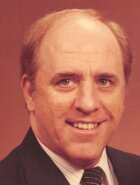

William Louis Parker
August 9, 1941 — January 15, 2018

Send a Gift
Past Services
Interment Location
Woodlawn Cemetery- Toledo, Ohio
William Louis Parker
Bill Parker was deeply fascinated by Medieval history, but he was truly a Renaissance man.
Born in Ohio in 1941 of French-Belgian descent he spent his life in search of knowledge, both classical and contemporary.
A lifelong student of history who graduated University with honors, he became particularly passionate with three things: language, classical music and the life and times of Charlemagne—Charles the Great, sometimes referred to as the father of Europe—a man of many interests, including scholarship and culture.
In his death, Bill left us with memories of an inimitably irrepressible bon vivant, a gentleman, a scholar, a man of good humor—and a man of faith
Those who knew Bill and a bit of history might argue, persuasively, that he was very much like Charlemagne.
In his youth, he relished the attention he received as an only child; his parents surrounded him with books and culture.
His hunger for knowledge was insatiable. He spoke eight languages.
He pursued a career in classical music history.
He once told the story of his rejection by a prestigious college of music, which he desperately wanted to attend. After a lengthy interview by the Dean he was told that under no circumstances would he be admitted. He had answered every question correctly. Bewildered, he asked,†but why?â€.
The Dean replied, “Because we have nothing here we can teach you.â€
In 1975 he joined Minnesota Public Radio as a classical music announcer where he shared his knowledge—and love of—music (particularly the opera) with hundreds of thousands, perhaps millions, of listeners for nearly two decades. His legendary contribution to MPR listeners has not been forgotten: https://www.classicalmpr.org/story/2018/01/18/onetime-classical-mpr-host-bill-parker-dies
Following his retirement from MPR, his career as a classical music historian and commentator continued as a consultant to numerous music record labels and as a classical music curator for Best Buy.
Challenged by the sudden onset of a progressive illness, he spent his final years in a nursing home, where he delighted both staff and visitors with his intelligence, perseverance, wit and goodwill.
He was a people person. Those who knew him knew that although he was a person of refined tastes, he enjoyed nothing more than a McDonald’s vanilla milk shake (never a malt) and a good macaroon cookie from the Walmart bakery.
Those traits, as well as decades of sharing his knowledge of music are his legacy. He also leaves behind an unfinished manuscript from another of his persistent passions—a novel set in the time of Charlemagne, the Emperor who ushered in the cultural and intellectual Renaissance of Europe—a renaissance of which Bill was clearly emblematic.
To order memorial trees or send flowers to the family in memory of William Louis Parker, please visit our flower store.
Past Services
Guestbook
This site is protected by reCAPTCHA and the
Google Privacy Policy and Terms of Service apply.
Service map data © OpenStreetMap contributors




